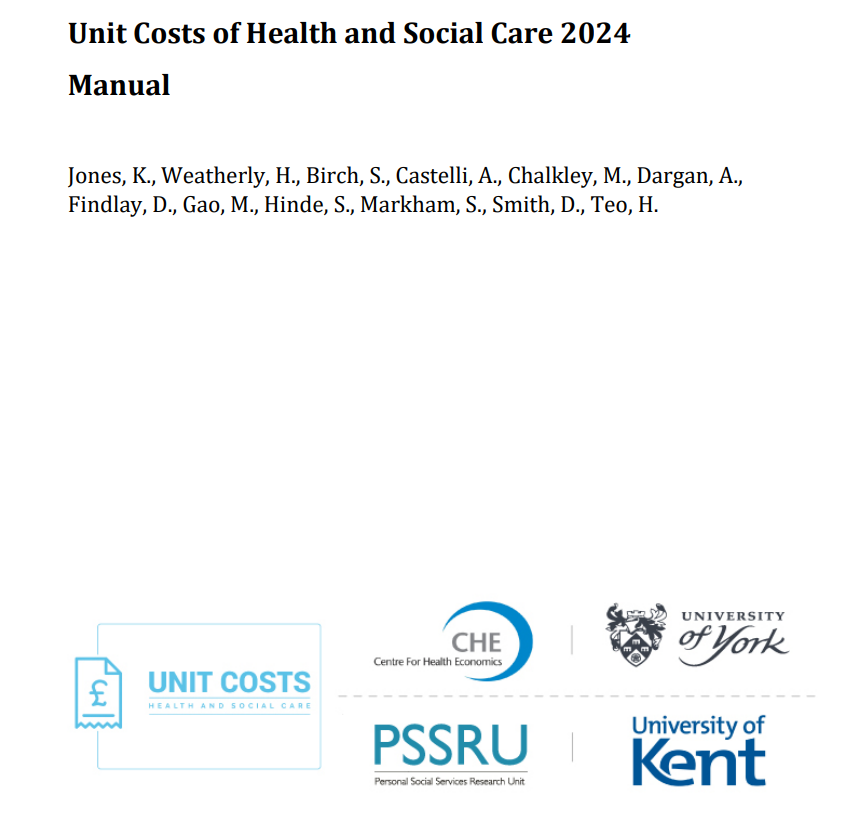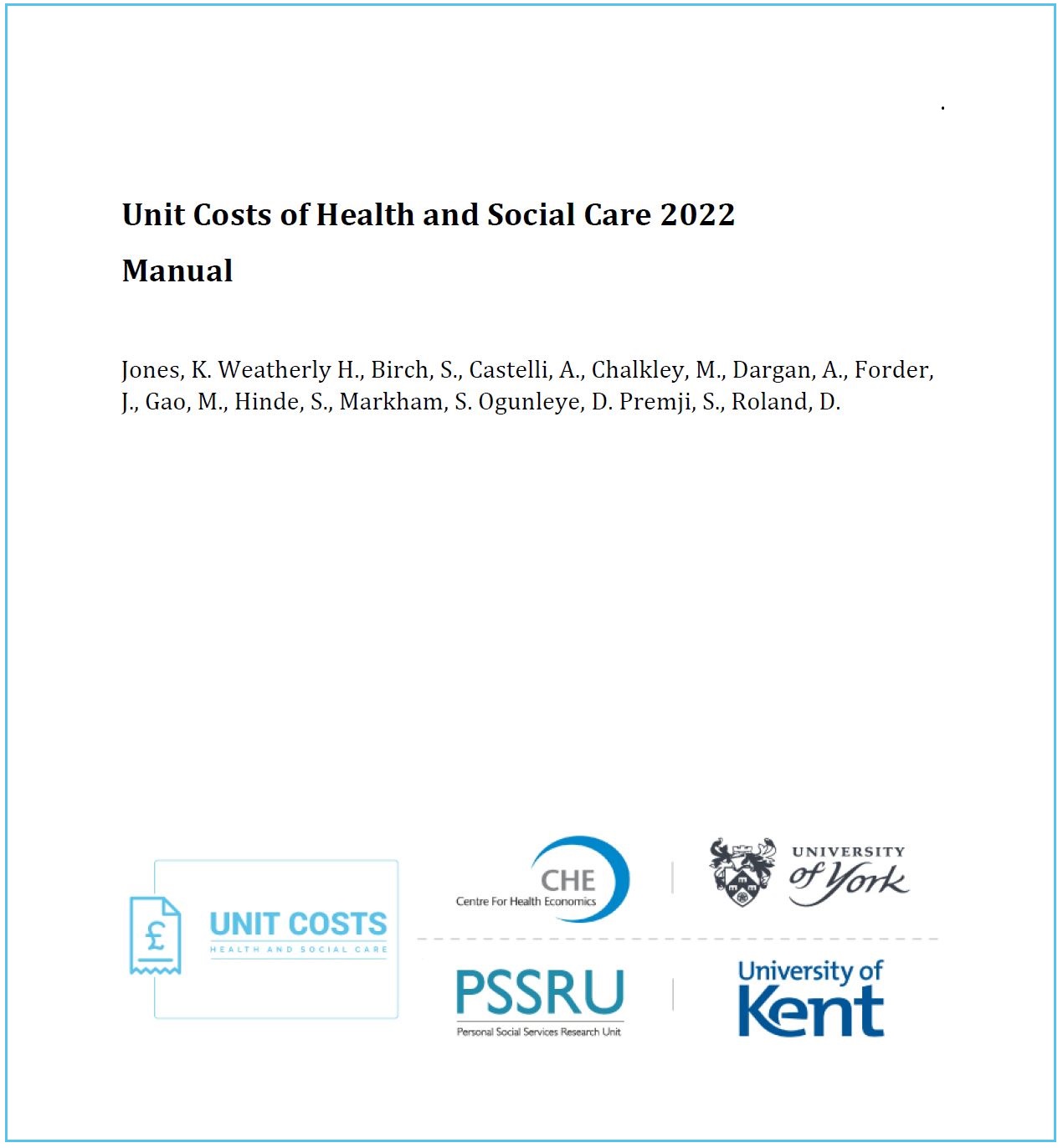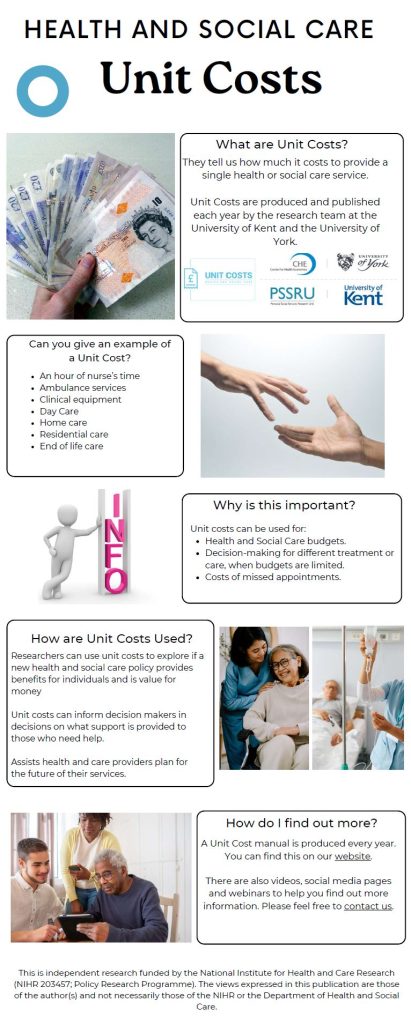Menu
- New Unit Cost programme
- Unit Costs Manual 2024
- Unit Costs Manual 2023
- Unit Costs Manual 2022
- Unit Costs Infographic
- Unit Costs 2003-2021
- Public Involvement and Engagement
- Blog & Events
- Meet the team
- Send us feedback
| New Unit Costs of Health and Social Care Programme In 2022, the Personal Social Services Research Unit (PSSRU) at the University of Kent and the Centre for Health Economics (CHE) at the University of York began an exciting and innovative collaboration to estimate unit costs for health and social care and to deliver an annual volume. This builds on PSSRU’s successful approach and long experience to produce, publish and present information about costs, as outlined in the Story So Far tab. Funded by the National Institute of Health and Care Research (NIHR) Policy Research Programme (PRP), PSSRU and CHE will together move the Unit Cost Programme forward over the next five years. Knowing the cost of health and social care services plays an important role in informing what support is provided to those who need help. The cost of services affects choices about health and social care provision and about how best to spend limited care budgets. Using consistent and reliable cost information is important for decision-makers in health and social care and for research. The aim is to ensure the results are up-to-date, comprehensive, responsive and relevant to those who use them. There are five associated work packages. Work package 1: Review and scope We will annually review the developments in the health and social care sectors (e.g. new services, new datasets) to ensure our cost estimations are up to date and relevant. Work package 2: Enhancing what we offer Throughout the programme, we will work with users of the cost information (e.g. health and social care professionals, individuals who require help from care services and their family carers, alongside general members of the public) to explore how to best produce and publish this information in a useful form. Work package 3: Costing approach We will continuously explore whether we can improve on the way we calculate costs, what data we use, and how we report the information. Work package 4: Involvement and Engagement We will involve users of our cost estimates in the research programme to ensure that their views inform the design, direction, and content. Activities will include stakeholder workshops to help understand how people use unit costs in practice. Work package 5: Unit Costs of Health and Social Care Manual We will produce annual cost estimations drawing on the four work packages above. This diagram illustrations the overall programme of work. |
| PSSRU at the University of Kent has produced the annual cost estimates for the delivery of health and social care services for 29 years. Lesley Curtis, a Senior Research Fellow at PSSRU led the Unit Costs of Health and Social Care programme, alongside Amanda Burns Jennifer Beecham. The previous Unit Costs volumes can be found here. The Unit Costs of Health and Social Care contract was completed in 2022. We would like to thank our Advisory Group (Ross Campbell, Adriana Castelli, Ciara Donnelly, Sebastian Hinde, Tracey Sach, James Shearer, Adam Storrow and Jonathan White) for their input at our meetings. We would also like to thank colleagues from the Department of Health and Social Care, NHS Digital and the Department of Education who shared the relevant datasets so we could estimate the unit costs. In addition, we received invaluable assistance from Anna Peckham, Sarah Godfrey, Alan Dargan and Ed Ludlow from the University of Kent. Thank you to you all. We are so excited for the next five years and the collaboration between PSSRU and CHE. |
| The research team are committed to enhancing the Unit Costs of Health and Social Care programme through public involvement and engagement. We have four research advisors helping us to shape the programme and will be involved in all stages. The aim is for the research advisors to act as our ‘critical friends’ throughout the 5 years and advise on:
|
Blog Title |
Bringing Unit Costs to a wider audience: Making the invisible visibleMembers of the Unit Cost programme met with our Patient and Public Involvement and Engagement (PPIE) Research Advisors for our first Unit Cost PPIE project discussion in November 2022. Unit costs of health and social care quantifies the resources required to produce these services in monetary terms. The purpose of the meeting was to jointly develop our understanding of how Research Advisors involvement will work in the programme and to think through how, together, we can make the most of the Unit Cost programme, over its 5 year time horizon. We were keen to identify creative, impactful, opportunistic ways to draw on a range of views on unit costs and create more value from the research through our public involvement activities. - Click the title to read the full post |
| We currently have 2 online webinars planned for 2025: Webinar 1 – ‘An Overview of the Unit Costs Programme’ (Tuesday 6th May, 12-1pm): In this webinar various members of our team will discuss what Unit Costs are, with examples, and why these are important. This will be of interest to people who use the Unit Costs Manual, people who are new to the Unit Costs Manual, health and social care colleagues and members of the public. You will have the opportunity to ask any questions you have about the Unit Costs Programme during our dedicated Q+A session! Webinar 1 – Teams Registration Link Webinar 2 – ‘An Introduction to the new Unit Cost Adjuster’ (Thursday 5th June, 12-1pm): In this webinar, we will introduce the new Unit Cost Adjuster with a demonstration, and provide an overview of how this has been developed and how you could use this for your future Unit cost calculations in a more accessible and interactive way. This will be of interest to people who want to find out more about this new tool for cost calculations. Webinar 2 – Teams Registration Link How do I register my interest in attending the webinar(s)? Please register your interest in attending in either or both webinars through our Teams registration links. If you have any questions or accessibility needs, please contact our Public Involvement and Engagement manager, Sarah Birch (email: s.j.birch@kent.ac.uk; 01227 824967). Please note, we will not be able to cover any public involvement time or expenses for attending this webinar series. |
 | Sarah Birch is a Public Involvement and Engagement Manager at PSSRU within the University of Kent, supporting a variety of programmes including ‘Quality, Safety and Outcomes of Health and Social Care (QSO) Policy Research Unit’ and ‘Unit Costs for Health and Social Care’. Sarah works with members in our Public Involvement Strategy and Implementation Group (PISIG) and our Public Involvement Research Advisory Network (PIRAN) to ensure strategic and advisory patient and public involvement and engagement is embedded within the research unit. |
 | Adriana Castelli is a Senior Research Fellow in the Health Policy Team at CHE. Her research interests include health policy reforms evaluation, health system efficiency and performance measurement with a particular focus on the development of productivity measures of healthcare goods and services. Adriana has an advisory role for the overall programme, with a focus on Unit Cost and labour costing methods, as well as providing overall advice on health care data. |
 | Martin Chalkley is Professor of Health Economics in CHE. His research has focused on assessing the impact of different remuneration methods (such as Payment by Results) on healthcare delivery. He has expertise in regard to the link between payment and incentives and originally worked in the field of labour economics before specialising in healthcare. |
 | Alan Dargan supports the work of researchers in the PSSRU at Kent. |
 | Minyue Gao is a Research Fellow with the Team for Economic Evaluation and Health Technology Assessment (TEEHTA) at the Centre for Health Economics (CHE), University of York. She is interested in techniques and methodologies used in economic evaluations and will mainly contribute to conducting the scoping review and developing a costing toolkit for this project. |
 | Sebastian Hinde Sebastian Hinde is a Research Fellow in the Team for Economic Evaluation and Health Technology Assessment (TEEHTA) in the Centre for Health Economics at the University of York. Sebastian has conducted economic evaluations in a range of disease areas, with recent research focusing on the role of economic evaluations to inform commissioning decisions made by local decision makers. He has an advisory role for the overall programme with specific focus on the production of the unit cost toolkit. |
 | Karen Jones is a Professor and Director of PSSRU. Karen is the Principal Investigator and will provide leadership for the overall research programme over the next 5 years. Karen has 20 years’ experience in researching cost-related issues in adult social care, alongside conducting systematic reviews and presenting costing information in an accessible format. |
 | Shainur Premji is a Research Fellow with the Team for Economic Evaluation and Health Technology Assessment (TEEHTA) at the Centre for Health Economics, University of York. For this project, Shainur will be involved in gathering stakeholder feedback on previous versions of the Unit Cost Manual and conducting a scoping review to identify existing sources of data that may be used to calculate unit costs, and existing resource use, costing toolkits, or new services that may be used to inform future versions of the Unit Costs Manual. |
 | Helen Weatherly is a Professor of health and social care economics at Centre for Health Economics, University of York. She's the York Principal Investigator and, in collaboration with Karen, she'll lead the research on unit costs for inclusion in the Unit Cost for Health and Social Care Manual over the next 5 years. Helen has undertaken many economic evaluations of health and social care services using unit costs from the Manual. She has undertaken cost-related research and was formerly an Advisor to the programme. |
| Research Advisors | |
 | Dr. Sarah Markham is a mental health patient who is an experienced patient advisor, a member of BMJ’s International Patient Panel. As a patient she is actively engaged in mental health advocacy and service improvement working with the Royal College of Psychiatrists, NHS England and other national organisations in the UK. She is also a Visiting Researcher in the Department of Biostatistics and Health Informatics, King's College London and has a PhD in mathematics. Sarah is keen to support the Unit Costs programme to enhance its accessibility, relevance and use, and thereby be of optimal benefit to services, patients and the wider public. |
Views: 61089



